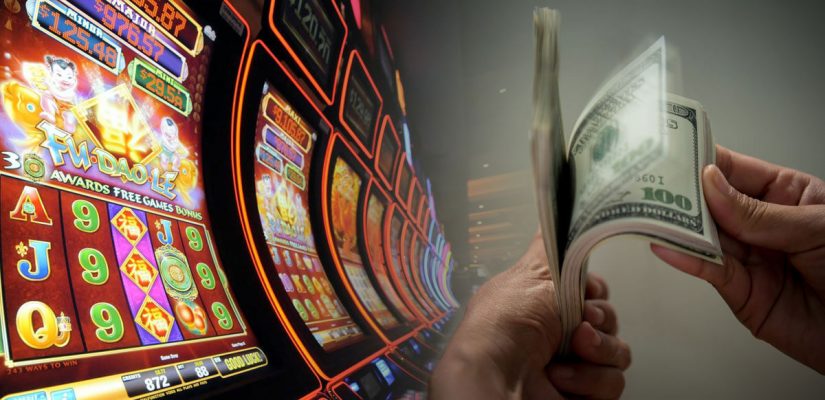
Slot machine payout percentage determines your chances of getting that big win. In this guide, we can identify four basic ways to figure out the payout percentage of a particular slot machine.
We also help you determine the payout percentage of a slot machine you’re about to play. I thought of four solid methods for working out a machine’s theoretical RTP and decided to put them all in one post.
For players curious about payout percentage, it’s important to start with a basic understanding of the way gambling math intersects with slot play. Keep reading below to find out more.
Four Ways to Figure Out a Slot Machine’s RTP
A Guide to Probability, House Edge, RTP, and Other Slot Math
Probability is a five-dollar word that refers to the likelihood of an event occurring. Let’s say that you buy a lottery ticket and want to figure out how likely you are to win the $100,000 top payout—the math you would do to figure that out is called probability.
Let’s start with something we all understand—a coin flip. The probability of a coin landing heads-up is 50%, which can also be expressed as a decimal—0.5. Probability is always expressed between 0 and 1, where 1 is a 100% likelihood and 0 is a 100% non-likelihood.
Obviously, the closer to the number 1, the more likely an event is to happen. We have other ways of referring to a 50% likelihood, the most important ones for gamblers are 1/2 and 1:1.
Probability and House Edge
It relates to something near and dear to slot player’s hearts—the casino’s edge. A game’s house edge represents how much the casino will win on average over a long period of time from a particular bet.
Obviously, this is a theoretical number based entirely on math and not necessarily a prediction of real-world outcomes. Let’s move on from the coin flip and discuss a theoretical slot machine. This machine has a house edge of 7%. Theoretically, that means that for every $100 you wager on the slot, you should expect to lose $7. Remember that your real results over the course of an hour of play will likely be a little different and that house edge is truly theoretical. Over an infinite amount of play, the house edge becomes more and more accurate. Few of us have an infinite amount of time to play slots.
I’d like to add that good old variance (the likelihood that small sample sizes produce unpredictable results) is a profit-driving feature of casino gambling, not some accidental bug that keeps bettors forever in the red.
Difference Between RTP and Payback Percentage
This one’s easy. There is no difference. You can use these terms interchangeably, just like most of us gambling writers do.
Our slot machine with a 7% house edge has a 93% payback percentage—the two numbers will always add up to 100%.
Data Needed to Calculate Slot Machine Payback Percentage
Realistically, you need two pieces of information to work out a slot’s house edge (and thus also its payback percentage).
Hopefully, as a slots player, you know that you can read paytables to determine exactly what amount of money you stand to win. That information is freely available.
If slot machines posted their full probability information along with payouts, working out each game’s payback percentage would be as easy as using a calculator for about ten seconds.
The casinos actually make money off player ignorance in cases like this. They count on the fact that any short-term wins you hit will be balanced by long-term losses. Small jackpots keep us interested in the game. Mathematics keeps the casino’s stockholders skiing in Aspen.
How to Determine Slot Machine Payout Percentage
At the very beginning of the post, I briefly touched on four ways you can work out a game’s payout percentage. Below is a more detailed explanation of each of these four methods.
Determine Slot Payout Percentage by Reading the Game’s Information Screen
I’ve played slots in twelve different US states and a number of different casinos. I’ve never seen a slot machine in America labeled with its probabilities and such.
I’ve seen photos of old Vegas casino floors advertising slot machine payouts, but even those were more general, indicating that a particular bank of machines “averages” a particular payout percentage or whatever. However, if you’re gambling in Europe or parts of southeast Asia, I’ve been told that you can often find machines with probabilities listed, though I’ve never actually seen one of these things myself.
If you find a game like this, all you’d have to do is read the posted information and work out for yourself if a particular game is worth play or offers any kind of value.
Determine Slot Payout Percentage by Looking It Up
Some slot manufacturers post specific RTP figures for their slot machines. This is apparently more common with online slots manufacturers, though I’ve definitely seen these details available through the manufacturers of land-based slots as well.
I guess you could get a decent sense of a game’s RTP, so long as you don’t mind being off by a couple of percentage points. For example, if you know a game’s default is 90%, your expectation of that game should be more like 88% to 92% on any given day. That’s not a great way to play as an advantage gambler, but it could steer more casual slots players toward or away a particular game.
Determine Slot Payout Percentage by Researching Average Payouts
The best information available to most American slots players comes in the form of monthly (or sometimes annual) reports by state gaming boards and other regulators, who in some cases are required to report slot machine data in a general way. In most states with these regulations, the reports are monthly and are territorial.
Some denominations are less common in certain areas; for example, in the Central Mississippi region, there are very few $0.10 slots. Knowing the average payout for all $0.10 slot machines in that part of the state could help you decide, so long as there are only a couple dozen machines available.
Determine Slot Payout Percentage by Tracking Your Play
Here’s a stupid idea that probably won’t work: Track your play on a slot machine and you can develop a bespoke sense of a machine’s payouts over the short term. I say it’s stupid and won’t work because you’re going to have to dump a lot of money into a game over a long period of time for it to work in any meaningful way.
- First, you need to know your spins per hour. Use your phone timer to clock yourself for five minutes, then multiply that number of spins by 12. There are your spins per hour.
- Next, pick a unit bet size. That just means bet the same amount each spin. Let’s pick $0.25 for convenience.
- Take notes. Write down how much cash you started with and how much you have at the end of your hour of play.
Let’s say your bankroll is $300, and you’re making 300 spins an hour at $0.25 per spin. That’s a total outlay of $75 per hour. After one hour of play, you’re down to $290. That’s $10 in losses across 300 spins, or about $0.3 in losses per spin. Since $0.3 is 40% of $0.25,
Why can’t we declare the machine I was playing to be an 87.5% RTP machine? The easy answer is variance. My one-hour session is nothing compared to the infinite life of the math behind the game. Any other player’s results are likely to vary pretty greatly from my own.
Conclusion
American slots fans will find very few slot machines with clearly posted RTP figures. Once upon a time, Vegas casinos had quite a few RTP advertisements and even some machines with posted probabilities, but that tradition is dying out.
If you have the patience and the bankroll, you can calculate your real payback percentages over whatever short run of time you can afford. You could also choose to only play those slots that post RTP figures, though you’d have precious few games to choose from.




You must be logged in to comment. Don't have an account? Sign up today.